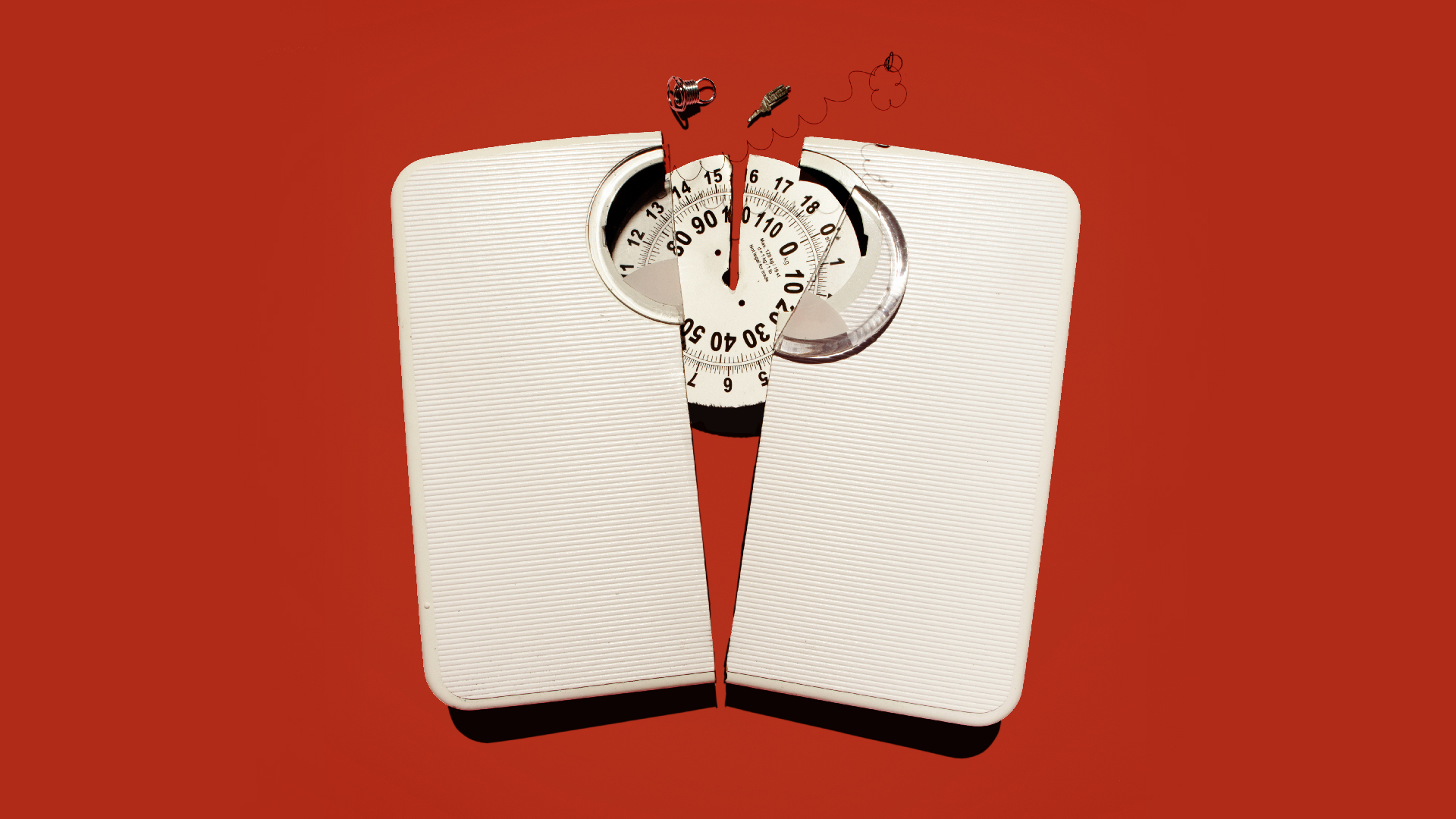People's mental health often improves after weight-loss surgery. A study pinpoints the real reason why.
Feeling less stigma — not losing weight — was linked to better mental health and eating behaviors after bariatric surgery.

Even before kindergarten, Autumn Lloyd feared other kids wouldn't like her because she was twice their size.
—ANAD Eating Disorders Helpline: 1 (888)-375-7767
—NEDA Eating Disorders Screening Tool
—Crisis Text Line: Text "HOME” to 741-741
—Suicide and Crisis Lifeline: Call, text or chat online
In high school, she lost more than half her body weight through a punishing and unsustainable regimen of diet and exercise, which was celebrated by her peers and even featured in a local newspaper.
"Even though I excelled academically, I feel like it never quite mattered as much as this vanity piece," Lloyd told Live Science.
When the weight later returned, as research shows it often does, Lloyd felt scrutinized, which led to her obsessively monitoring her eating and exercise in public, while binge eating in private. A dietician suggested she track her food intake, but it became an obsession, and the pressure to lose weight contributed to self-injury and depression.
By college, she'd been hospitalized twice for suicidal thoughts, with her weight deeply tied to her mental health. She continued a grueling exercise regimen — even running the Chicago marathon twice — before reaching her lowest adult weight. Then the weight returned.
After further weight gain, Lloyd underwent bariatric surgery in 2022, dropping a substantial amount of weight but less than the median. She felt judged by others. "If you appear to be obese, and didn't hit your weight goal, you look [to some] like a failure," she said.
Lloyd's experience of being scrutinized and negatively judged for her weight is not unique. The negative mental health consequences Lloyd faced are also not rare. A growing body of evidence suggests that weight stigma itself leads to poorer mental, physical and economic health for people with higher body weights.
Get the world’s most fascinating discoveries delivered straight to your inbox.
"It really is the norm," Larissa McGarrity, a clinical psychologist at University of Utah Health who studies mental health after weight-loss surgery.
Lloyd's experience of facing weight stigma even after surgery — and that affecting her mental health — is also common.
New research by McGarrity and colleagues suggests that this stigma affects how patients fare after bariatric surgery. Their study, which was published June 5 in the journal Health Psychology, found that shedding weight stigma — rather than the weight itself — may explain why some people report better mental health and less disordered eating after weight-loss surgery.
On the flip side, people who underwent weight-loss surgery but still faced stigma afterward were at higher risk for depression, anxiety and disordered eating compared to their less-stigmatized peers, the study found. These findings suggest that the stigma, not just body size, presents a major barrier to better health for those with obesity.
Related: Childhood obesity should be treated early and aggressively, new guidelines say. Is that safe?
What is weight stigma?
Bias against people who are overweight often stems from the misconception that a person's body weight is entirely within their personal control and can be managed with diet and exercise alone. Research, however, shows that weight is shaped by a complex mix of genetic, physiological, psychological and social factors. Studies show that for most, losing weight and maintaining that weight loss long-term is very difficult without proper medical assistance.
Weight stigma is pervasive, with over 40% of U.S. adults reporting that they've experienced it personally at some point in their lives. Growing evidence shows that weight stigma does not help with weight loss, and what's more, it can worsen health. It's associated with increased stress, inflammation and mental health issues, including depression and disordered eating behaviors, according to the World Obesity Federation.
"There's considerable evidence that societal weight stigma is prevalent and has harmful health consequences for people with obesity," said Rebecca Puhl, deputy director for the Rudd Center for Food Policy and Health at the University of Connecticut, who was not involved in the new study.
However, there's little data about what happens to people after they lose weight through surgery — the most effective intervention for severe obesity and one that's become more common in recent years.
"This new study begins to address this research gap," Puhl told Live Science.
Losing weight doesn't make you "immune"' to stigma
Past research showed that while bariatric surgery improves mental health for most, some people see their mental health worsen afterward. Previous work has also hinted that weight stigma could play a role in the amount of weight lost or regained after surgery.
To understand the effect of weight stigma in this dynamic before and after weight-loss treatment, McGarrity and her colleagues recruited 148 patients who underwent bariatric surgery. They collected data before surgery and 1.5 to three years afterward, measuring patients' experiences of weight stigma in the week prior to survey, alongside measures of their mental health and eating behaviors.
Bariatric surgery patients are not immune to the effects of weight stigma, even years after surgery, even after significant amounts of weight loss.
Larissa McGarrity, University of Utah Health
More than 90% of the patients reported experiencing stigma before the procedure, and most — about 60% — experienced significantly less weight stigma post-surgery.
Those who experienced less stigma afterward saw notable improvements in mental and physical health. They were more likely to have a lower weight at that time point compared to patients who continued experiencing stigma post-surgery. However, weight loss itself was not associated with the improvement in mental health.
Related: Weight-loss surgery is becoming more common among US teens
About 40% of participants reported regularly experiencing weight stigma following their procedures, and these people were at increased risk for mental health problems compared to their peers. The higher the level of weight stigma reported post-operatively, the higher the risk for poor mental health, eating behavior and weight outcomes. Again, these effects appeared to be tied to the perception of stigma rather than to any weight loss they had after the surgery.
The study suggests "bariatric surgery patients are not immune to the effects of weight stigma, even years after surgery, even after significant amounts of weight loss," McGarrity said.
She emphasized that the study design has important limitations: the patients' experience of weight stigma was self-reported, and for obvious ethical reasons, the study didn't assign people to face differing levels of weight stigma. As such, it cannot directly establish cause and effect. Moreover, the patients were drawn from only one region and their perceived stigma was only measured at one time point after surgery.
Puhl added that it would also have been helpful to get a more detailed picture of the patient's experience over time. And more research is needed to understand how much this bias affected patient health.
The takeaways
The findings highlight how important it is to address weight stigma at every stage of a patient's weight journey, and not assume it will resolve after surgery, Puhl said.
McGarrity said public health and policy officials, as well as members of the media, should examine whether the public conversation around weight could be harming people's health. On an individual level, she said that everyone can "do better with the people in our lives who struggle with weight — to not just be one more person that conveys the [message of] 'just eat less and exercise more.'"
That jives with Lloyd's experience. "If you're in a world where weight stigma is hitting you from every side, I think that will directly hinder your progress," Lloyd said.
Lloyd says she's learned to tackle the aspect of weight stigma she can control: her own perception of her weight. To people who live with a higher weight, she says to be kind to themselves.
"The journey is very difficult. There's a lot of noise to filter through, and there's some fights that we just don't have the bandwidth to get into," Lloyd said. "You're not broken. You're not failing because you haven't reduced your weight."
Editor's note: This story was updated on June 11, 2025, to adjust Autumn Huett's name to Llyod, her married name. The article was first published June 10.
This article is for informational purposes only and is not meant to offer medical or mental health advice.

Marianne is a freelance science journalist specializing in health, space, and tech. She particularly likes writing about obesity, neurology, and infectious diseases, but also loves digging into the business of science and tech. Marianne was previously a news editor at The Lancet and Nature Medicine and the U.K. science reporter for Business Insider. Before becoming a writer, Marianne was a scientist studying how the body fights infections from malaria parasites and gut bacteria.
You must confirm your public display name before commenting
Please logout and then login again, you will then be prompted to enter your display name.
 Live Science Plus
Live Science Plus





